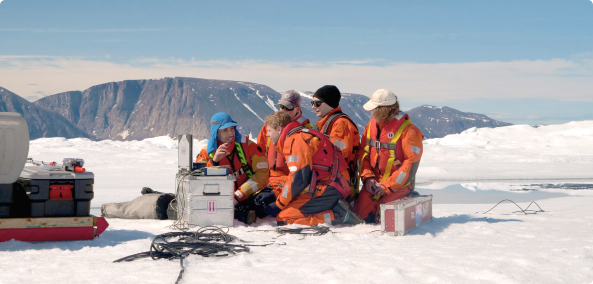Education and Outreach from Antarctica to Classrooms

The International Polar Foundation’s outreach activities towards young students through educational Skype classes have always been welcomed with enthusiasm since they were started more than 10 years ago, soon after the Princess Elisabeth Antarctica was built.
Over the past couple of months, Science Liaison Officer and Deputy Station Manager Henri Robert has given Skype classes via satellite to classes in England, Belgium and Spain about the scientific research being done around the Sør Rondane Mountains (which are not far from the Princess Elisabeth Antarctica), the functioning of the station, and the risks posed by climate change.
Engaging talks with students
In December, Henri spoke with a very passionate class at the Royal Hospital School in Ipswich, England. Henri spent a lot of time talking to them about the station. The students were so curious they asked him about a hundred questions!
The English school was very grateful for the time Henri spent speaking to them. They made a video summarising the experience and uploaded it to the school's Trilby TV platform.
Then in January, students at the Institut Montjoie High School in Brussels, Belgium were treated to lecture from Henri, which focused on numerous subjects related to the functioning of the Princess Elisabeth Antarctica, including the station’s “zero emission” approach to renewable energy production and management, the station’s water treatment system, and the concept of passive construction, which allows one to save an enormous amount of energy through sound design and insulation techniques.
Valentina Zvallia, a scientist who is part of the BELSPO-sponsored MICROBIAN project, and doing microbiological research in Antarctica, joined Henri in the lecture so the students could learn more about the research she and her colleagues are conducting. The students asked both of them about climate change and the effects of global warming not just around the world, but especially in Antarctica. During the conversation, the students came up with many ways they could adopt new habits to reduce their carbon and climate footprint.
Claire Gillet, the teachers in Belgium who organised the Skype class said the following about the experience for the students: “It was a very positive exchange of ideas that proposed new ways of thinking for the future. What a gift for a teacher! The students also loved your answer about the beauty of the surroundings of the station, the nature in the area and the quick look Henri and Valentina gave through the station’s window with the webcam. Thank you both for this communication and exchange that gives sense to what teachers are doing.”
Encouraging the next generation of scientists
Around twenty twelve-year-old children from the Escola Reina Elisenda Virolai primary school in Barcelona, Spain, participated in another Skype class in January with Henri Robert and Beatriz Roncero Ramos, a scientist also working on the MICROBIAN project. The discussion covered many topics, including the different scientific projects being done at the Princess Elisabeth Antarctica, as well as the work and daily life of scientists working there.
The participation of Beatriz in the discussion was especially significant for many of the young girls, who were encouraged to consider future careers in STEM subjects (science, technology, engineering and mathematics).
As Philippe Guisset, one of the organisers of the talks reported to Henri Robert afterwards: “It was a great present for these kids. It’s an experience they will remember forever. Did you see how many girls want to become a scientist? And when you said that they can maybe become scientists and come to the station they all screamed ‘I want to go!’”
The class invited Henri and Beatriz to Barcelona to recover from the cold of Antarctica. The students were thrilled at the idea of meeting them in person to learn more about their work and the Princess Elisabeth Antarctica.
Teaching young people climate awareness
Since the Princess Elisabeth Antarctica was constructed in 2007 - 2009, the International Polar Foundation has been keen to have educational lectures and discussions with the younger generations to raise awareness about climate change and introduce them to everyday initiatives to reduce humanity's impact on the planet’s ecosystems.
Using the example of the Princess Elisabeth Antarctica - the first ever zero-emission research station in Antarctica - provides insights into the numerous opportunities at our disposal to tackle climate change and reduce energy consumption around the world. Young children will likely witness in their lifetimes significant impacts of climate change. Hence, giving them the possibility to talk with scientists actively conducting research on relevant topics encourages them to become even more passionate about science, nature conservation, and to become climate activists.
If your school would like to organise a Skype class with some of the scientists and engineers working with the International Polar Foundation, please feel free to contact Henri Robert at science@polarfoundaiton.org .
We look forward to hearing from you!
Download





















